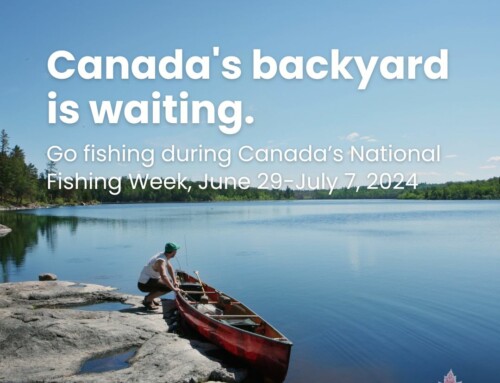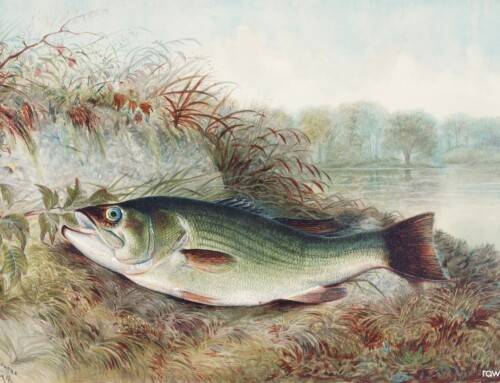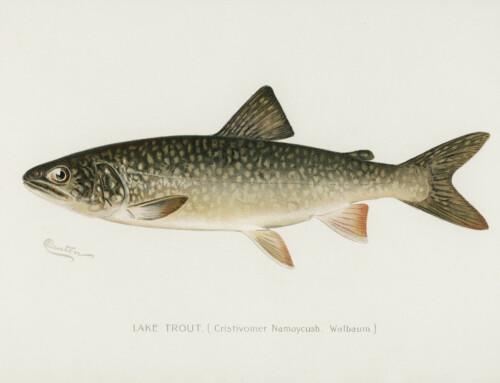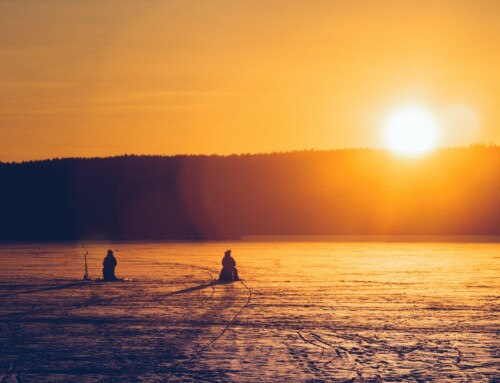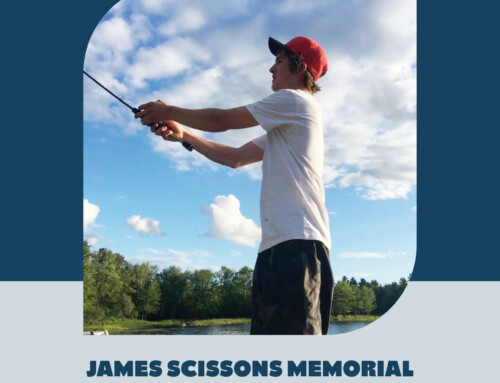Mike Sklad is the founder of Fishing Friendzy, a travelling fishing exhibit dedicated to introducing ethical angling to children and parents. He and his team of ambassadors also help foster a new generation of responsible anglers through a Youth Fishing League and other valuable programs.
We will be continuing to chat with Canadian anglers who contribute to the overall success of sportfishing as a heritage activity. Here’s what Mike has to say about his career on the water and the work that he does through Fishing Friendzy.
Who introduced you to fishing? Can you describe any fond memories you may have of that experience?
My father taught me how to fish. As an avid weekend angler he would pack up the Coleman canoes and take me and my older brother out bass fishing on small lakes around our cottage.
Tell us a bit about Fishing Friendzy and the projects you work on.
Fishing Friendzy is a company run by Melissa and Michael Sklad (husband and wife). We started operating an educational interactive traveling fishing exhibit designed to be set up at fairs, festivals, and other events, allowing us to bring the basic education of angling to families of different communities.
Fishing Friendzy has since evolved into a few different programs. We designed a Youth Fishing League as the next step for kids who loved learning about ethical angling at our exhibit to participate in. This is the second year operating our Youth Fishing League and we have expanded from last year’s 2 leagues to 9 leagues. We plan on having leagues all across North America to give kids and parents alternative options from other community programs such as dance, gymnastics, sports leagues, and music lessons.
Our last program that we are very excited about is our S.A.F.E (Sponsor A Fishing Experience) program. We get a sponsoring company to send an underprivileged child, a person with disabilities or a veteran fishing with us for the day. We will be telling the story of each fishing experience through social media as a way to capture those special moments. This program is a great feel-good program. We are grateful to be working with Advanced Marine Lake Belwood. They will be supplying us with a boat to take people out on the water.
Why did you think it was important to create Fishing Friendzy?
This may be my favourite question ever asked. Why it’s important to me to teach kids how to fish is because it’s much more than just teaching kids about casting, catching, lures and safety. It’s about teaching them how to appreciate and connect with nature. Some of the best parts of fishing are in between the catches (as that is not even guaranteed). It’s the journey of going to the lake or walking the river’s edge. It’s the memories you make with those special people who go fishing with you.
But the most important reason why we created Fishing Friendzy is because of the impact a mentoring program like ours can have on our future. These children will be the politicians, CEOs and leaders of our future, and if we can teach them how to be good stewards of this earth, we will ensure they will make decisions to protect our natural habitat rather then destroy it.
Another big reason is because it gives my life meaning and purpose to influence children in a positive way through connecting them to nature. Building leagues in communities also involves bringing the community together, from gaining local support through sponsorship and from giving parents, local anglers and high school students an opportunity to volunteer as coaches and assistant coaches or to become mentors themselves.
What are your thoughts on the fishing community? Has it grown with the use of social media?
Our fishing community has grown in a lot of great ways. We are able to watch so many educational fishing tutorials. We are able to hear from successful anglers on how they made it in the fishing industry. And most of all, social media allows us anglers to network with each other even if we live across the country.
With social media there are some negatives, especially if we over use it or abuse it. I think social media is a wonderful tool to use to help reduce the misconceptions some people may have about angling. There have been so many parents and kids who have said to me they thought fishing was boring. When I asked them how their first fishing experience was, I often found out they sat in one spot and waited for the fish to come to them all day (to me that is boring as well). So I like to tell them how many different ways there are to fish. It opens their eyes to some options.
Being able to market on social media helps companies grow or stay afloat, and it also helps consumers learn more about products that they might be interested in.
What do you consider “ethical angling?”
Ethical angling is all about respecting our natural world. It’s about respecting the fish, animals, forests and waters. It’s about self growth and being open-minded to learning something new.
We at Fishing Friendzy promote catch and release, but it’s also okay to harvest some fish. We like to educate people to always release the really big fish because they are great breeding fish. Big fish don’t taste as good as medium size fish. And even if you want your trophy catch hung on the wall, you can still get one just by taking photos and taking measurements.
Being an ethical angler is really being a good conservationist and going above and beyond to keep our lakes and forests clean. It’s also important to help others who don’t know the rules and may be fishing illegally. It’s very important not to get into any confrontations with unethical anglers or anti-angling groups. We stay peaceful and respectful of all things.
Why do you believe recreational fishing is important to Canadians?
It’s important to Canadians because we have so many amazing fresh water lakes and forests. We as humans need these to survive. When we connect with nature through activities we love, like fishing or hunting or bird watching, we want to protect the land and waters. Connecting to nature means protecting it. The more people we can teach about ethical angling, the more people we will have protecting our natural resources.
As anglers, do we have a responsibility to look after our natural resources? How should we go about this?
As HUMANS we have that same responsibility to look after our natural resources. It’s on us all to protect our earth. Everything runs downstream. We all must be conscious of our actions and the effects our actions have on our natural world. We can create or we can destroy. I will refer to the great law of the Iroquois confederacy: “in our greatest deliberation we must consider the impact of our decisions on the next 7 generations”. These words touch my soul and have impacted my choices deeply. The indigenous people of these lands have so much respect for it and all living beings. We need to learn from their ancient teachings.
What issues currently affect recreational fishing? What can we do to solve these issues?
A big concern is anti-angling groups, peta groups and people who interfere with us angling because of their beliefs. I strongly believe most of those people have good intentions. They likely have more similarities to us as conservationists, but there is a big line drawn between us. There is a stigma between the two groups that all anglers pollute and poach. The flip side is anglers may think all vegans are disrespectful protesters trying to cause confrontation.
Poachers do not represent all the anglers who care about the health of our lakes, rivers, forests, fish and animals. There are also many vegans who are not bad people. They don’t interfere with anglers and care deeply about our natural world, thus their dietary choices.
Both point fingers and group all the bad with the good and don’t want to accept and befriend each other. We are more alike than anyone wants to admit. We need to work together in order to protect our wildlife, forests, clean water and most of all our children.
Showing our children how to treat other human beings who don’t have the same beliefs is just as important as teaching our children to protect our earth.
Do you think anything needs to be done policy-wise to maintain our fishing heritage?
We need more of our government’s budget allocated to protecting our natural resources. It’s pretty vital for us to have clean water and forests to give us oxygen to live as a species.
The policies we have can’t be policed properly because there is such little funding for our conservation officers. If our communities and governments want to create jobs they should create jobs that have a direct positive effect on protecting our clean water, healthy forests, and wild animals.
Adding stricter punishments to those who break the laws and more programs to educate families and immigrants about ethical angling will help maintain our fishing heritage.
Are you able to share one of your favourite fishing photos with us and describe where it was taken?
Here is a photo
Do you know a Canadian angler who fits the profile of a “Champion of Recreational Fishing?” Perhaps they introduce new anglers to the sport, or advocate for sustainable policies in government. Maybe they’re breaking down barriers on and off the water, or creating innovative ways for people to fish ethically. We’d love to chat with them! Please contact us or email info@catchfishing.com.
Keep Canada Fishing is the national voice of Canada’s anglers. We lead the effort to preserve your right to sustainably fish on our lakes, oceans, rivers and streams. KCF strives to inform anglers of current and potential issues and threats affecting recreational fishing and access to public waters. As well, we motivate anglers to take action on matters of importance to the future of fishing and conservation. Furthermore, we’re your voice on Parliament Hill. If you would like to contribute to our efforts to “Keep Canada Fishing,” you can donate now via PayPal.


